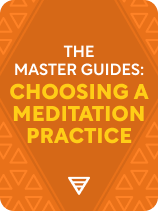

This article is an excerpt from the Shortform book guide to "The Master Guides: Choosing a Meditation Practice" by Shortform. Shortform has the world's best summaries and analyses of books you should be reading.
Like this article? Sign up for a free trial here.
Do you want to try meditation but don’t know where to start? Did you know you don’t need to practice religion to meditate?
Meditation comes in many shapes and forms. Whether you’re Buddhist, Hindu, Christian, or practice no religion at all, you can reap the benefits of meditation.
Here are three meditation tips for beginners to help you get started.
Meditation for Beginners
Do you struggle with anxiety, stress, or other strong emotions? Are you struggling to find time to relax in the busy modern world? If so, you could benefit from meditation: a practice that many people find helpful for reducing stress, sharpening focus, and getting their thoughts in order. In fact, a Zen proverb says you should meditate for 20 minutes every day—and if you think you’re too busy for that, then you should probably meditate for an hour every day. People from all walks of life, both religious and secular, have practiced and written about meditation for thousands of years, and it continues to be a popular relaxation method today.
Tips for Starting to Meditate
Here are some meditation tips for beginners, regardless of which style (or styles) of meditation you practice.
Tip #1: Start Small
If you’re struggling to figure out how meditation can fit into your schedule, or if getting started seems daunting, begin with very short meditation sessions. For example, in You Are a Badass, self-help author Jen Sincero says that just five minutes a day is enough to get you started. You can then start making your meditations longer at whatever rate feels natural to you.
Tip #2: Build a Support Network
In Emotional Intelligence 2.0, the authors suggest seeking outside support when tackling difficult or daunting goals (like building a new meditation practice). They offer these two strategies:
1) Talk with a third party. When you’re in the midst of a challenging situation, it’s hard to see the bigger picture. Get an unbiased outside perspective to help you keep things objective and rational as you decipher your emotions and determine the best route forward. When possible, get advice from an expert—ask them about their methods, then try to implement some of their suggestions into your day-to-day life.
2) Publicize your goals. Working toward goals can be stressful. This stress often makes people abandon their objectives before they achieve them, especially when no one knows about them. When creating goals for yourself, share them and ask other people to hold you accountable. This gives you a support system to motivate you when faced with emotional obstacles that make you want to quit.
Tip #3: Try Active Meditation
Meditation doesn’t have to mean sitting quietly. If you’re feeling restless, you could try a walking meditation, as journalist Dan Harris describes in 10% Happier. Find a space where you can walk comfortably. Begin walking slowly back and forth along this path. While you walk, focus only on the process of walking. Think about each step you take: picking up your foot, moving your leg, and placing your foot back down. Harris notes that walking meditation isn’t the same as mindlessly pacing—you’re still focusing and constantly refocusing your attention when it wanders.
A variation on walking meditation is what self-help author Cal Newport (Deep Work) calls productive meditation—thinking about a problem while doing a low-intensity physical activity, such as walking or showering. This helps with problem-solving in two ways: First, the activity typically takes you away from distractions like your smartphone. Second, you train your ability to focus on the problem at hand, rather than daydreaming while doing a routine task.
Hatha yoga, which we discussed earlier in this Master Guide, is a more strenuous form of active meditation.

———End of Preview———
Like what you just read? Read the rest of the world's best book summary and analysis of Shortform's "The Master Guides: Choosing a Meditation Practice" at Shortform.
Here's what you'll find in our full The Master Guides: Choosing a Meditation Practice summary:
- The best, time-tested advice on meditation from meditation experts
- A look at each of the four major meditation traditions
- How to choose a meditation practice that's right for you and your lifestyle






